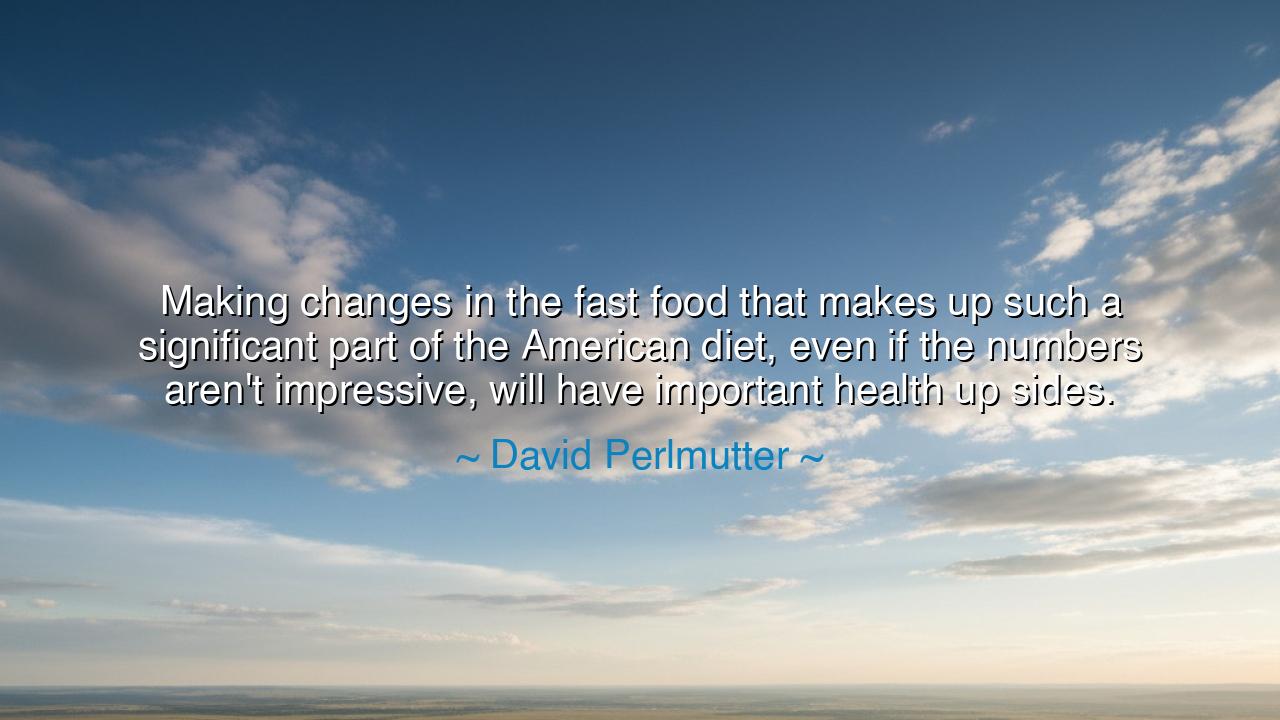
Making changes in the fast food that makes up such a significant
Making changes in the fast food that makes up such a significant part of the American diet, even if the numbers aren't impressive, will have important health up sides.






The words of David Perlmutter—“Making changes in the fast food that makes up such a significant part of the American diet, even if the numbers aren't impressive, will have important health up sides”—carry the quiet but enduring wisdom of incremental transformation. He does not call for grand revolutions, nor for the burning of golden arches; instead, he speaks of the power of small changes, the kind that ripple through generations. In this statement lies a deep truth of the human condition: that greatness is not always born in thunderous acts, but in steady correction, in mindful restraint, and in the willingness to take one humble step toward health, even when the mountain looms high before us.
To the ancients, this philosophy would have been familiar. The philosopher Confucius once said, “The man who moves a mountain begins by carrying away small stones.” So too, Perlmutter reminds us that the transformation of a culture’s dietary destiny does not begin with perfection, but with intention. The fast food he speaks of is not merely food—it is a symbol of the modern world’s haste, its hunger for convenience over care. Yet within that same system of excess lies the potential for redemption. To change even a small portion of what we consume is to begin the restoration of balance between body and spirit.
In the time of the Roman Empire, when excess feasts filled the halls of power, the Stoic philosopher Seneca warned of the corruption that follows indulgence. He wrote that “the body must be treated with strictness, that the mind may be strong.” But Rome, like modern America, often mistook plenty for prosperity. The result was decadence—an empire weakened from within by appetite. Perlmutter’s words echo across centuries: if we do not govern what we eat, what we eat will govern us. To purify even a portion of the modern diet is to reverse the moral decay of consumption, to reassert human choice over industrial seduction.
There is a profound humility in the doctor’s insight. He admits that the numbers may not be impressive—a phrase that conceals deep moral strength. For in an age obsessed with statistics, he speaks of faith in progress unseen, in healing that begins before the eye can measure it. Just as a tree roots itself in silence before it blooms, so do small changes in food and habit yield great harvests of well-being. To choose water over soda, a salad over fries, or even to eat with awareness instead of haste—these are not trivial acts. They are sacred rituals of renewal, each one a quiet defiance against the empire of decay.
Consider the story of Michelle Obama’s “Let’s Move!” initiative, which began not with laws or bans, but with education and partnership. She encouraged children to garden, families to cook, schools to serve fresh meals. Many mocked the effort as modest, but over time, awareness blossomed. Companies reformulated recipes, schools changed menus, and a new generation began to see food not as convenience, but as connection. What began as a ripple became a tide—a living testament to Perlmutter’s belief that even small reforms, though numerically small, can bear immeasurable health up sides.
There is also a moral dimension to this teaching. To reform fast food is not only to improve nutrition—it is to challenge the ethos of speed, the disease of modernity that devours time, patience, and presence. Fast food, after all, feeds more than the stomach; it feeds the illusion that life itself can be rushed. To slow down, to choose wisely, to make mindful substitutions—these are acts of rebellion against a world that prizes convenience over care. In each mindful choice, the soul remembers its rightful pace: the rhythm of nature, the balance of the body, the stillness of the spirit.
The lesson, then, is clear and profound. Do not despise small beginnings. Whether in diet, in discipline, or in virtue, the smallest change for the better sets in motion the grandest transformation. Perlmutter’s wisdom is a call to stewardship—of the body, of the culture, of the generations to come. When we change even a fraction of what is harmful, we honor the sacred duty of health, the bridge between life and purpose.
So let the children of tomorrow remember this truth: the fate of a people’s health does not change overnight, but heartbeat by heartbeat, meal by meal. Begin where you are. Replace one harmful habit with one healing choice. And though the numbers may not seem impressive, the outcome will be magnificent—for the greatest revolutions of mankind have always begun with the simplest acts of will.






AAdministratorAdministrator
Welcome, honored guests. Please leave a comment, we will respond soon